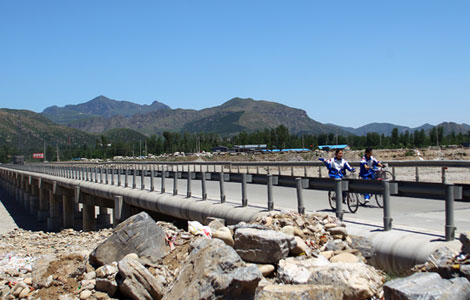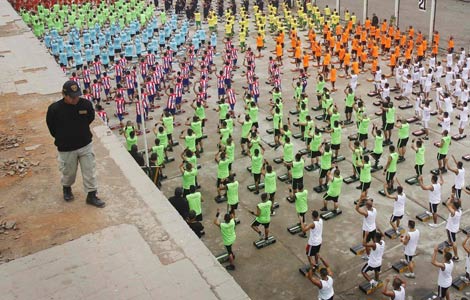Cross-Straits hostilities fading away
Updated: 2013-06-19 15:47
(Xinhua)
|
|||||||||||
XIAMEN - Taiwanese woman Huang Liang-yuh never thought she would meet her Mr Right during a trip to the mainland. But in 2009 she married a man from central mainland's Henan province, and settled down in Kaohsiung in Taiwan.
Accompanied with her three-year-old daughter at the fifth Straits Forum held over the weekend in the coastal city of Xiamen, in east mainland's Fujian province, Huang said her family is considering moving across the Straits to the mainland.
The Taiwan Straits has a width of 410 kilometers in the south and 200 kilometers in the north, with an average water depth of 60 meters, geographically blocking the two sides since ancient time.
In 1949, communication was broken off between the two sides, after the Kuomintang (KMT) lost a civil war with the Communist Party of China and fled to Taiwan, since when personnel exchanges were cut off.
Not until 1987 did the Taiwan authorities permit military veterans to visit their relatives on the mainland, terminating 38 years of estrangement between the two sides.
However, before May 2008, the situation across the Straits still remained tense and was even on the brink of crisis several times.
Kao Chia-chun, born in the island's Tainan, remembers the atmosphere of cross-Straits relations in the 1990s.
"I served in a combat troop in Taichung. Vacations were all canceled and we slept wearing helmets with guns in hands," said Kao Chia-chun.
Shortly after the end of the crisis, he managed to study traditional Chinese medicine on the mainland, and obtained a doctor degree as well as a professional doctorate certificate.
He was employed as a lecturer in Fujian University of Traditional Chinese Medicine, and also became the first Taiwanese graduate to earn a salary paid by the mainland government.
"Local people were amazed when I bought an apartment with public accumulated funds," Kao said, adding that he was also covered by social and medical care insurance.
"With booming grassroots exchanges, my children will be a new generation of Taiwanese, and they will surely have a deeper understanding of cross-Straits integration," Kao added.
Related Stories
Social networks close gap across Taiwan Straits 2013-06-18 20:20
Beach festival celebrates cross-Straits ties 2013-06-17 19:07
Fair to promote cross-Straits ties 2013-05-16 22:01
Businessmen expected to bridge cross-Straits ties 2013-05-16 01:52
Xi touts cross-Straits ties 2013-04-09 01:11
Today's Top News
Official executed for raping 11 minors
Sex tape official stands trial in Chongqing
Nordic countries team up in China's tech trade
4 detained in beating of French man
Monk distorts suicide as Tibetan self-immolation
UK lawmakers call for 'reckless' bankers to face jail
G8 statement on Syria 'nothing new'
Sino-EU trade talks aim to defuse solar tensions
Hot Topics
Lunar probe , China growth forecasts, Emission rules get tougher, China seen through 'colored lens', International board,
Editor's Picks

|

|

|

|

|

|





